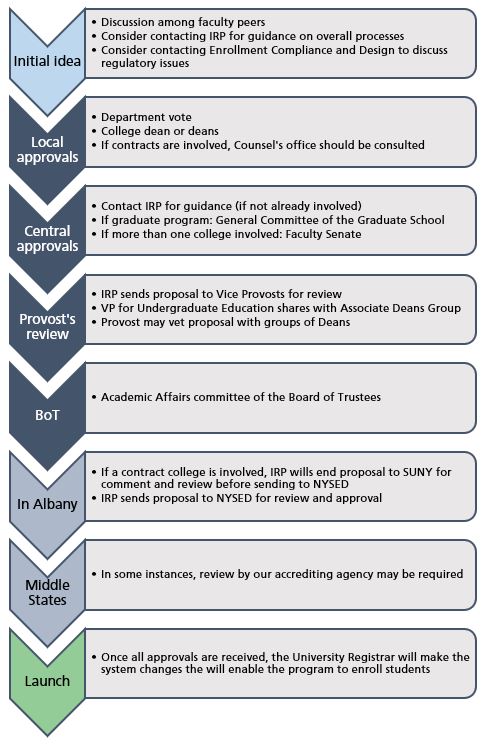Ideas for new majors or fields of study or concentrations–that is, academic programs–usually originate with faculty members. Faculty may flesh out their ideas with local leadership (e.g., department chairs, center directors, and/or the relevant college dean) to assess a program’s viability and resource implications. After this stage, the program is likely to be vetted by others across and outside the university.
The office of Institutional Research & Planning (IRP) in Day Hall is available to work with the faculty in developing the proposal to facilitate subsequent approval and registration processes. Please contact Kristin Walker at walker@cornell.edu if you are working on an academic program proposal.
How long does it take?
Program development and approval times vary greatly. Internal review processes are subject to the meeting schedules of the faculty and university bodies that need to review the proposals. Depending on the nature of the program proposal, some of these bodies may include:
- General Committee of the Graduate School which meets monthly during the academic year.
- Faculty Senate which meets monthly during the academic year.
- Associate Deans’ Group, convened by the Vice Provost for Undergraduate Education and which meets monthly during the academic year.
- The Provost’s Council which meets weekly during the semester, but the schedule is subject to change.
- Board of Trustees which four times during the academic year in October, January, March, and May.
After all internal approvals are secured, the proposal may have to be reviewed by the New York State Education Department in Albany. This step alone may take several months, but it is a legal requirement for new programs and some programmatic changes. Some programs (e.g., those involving a new location or a contractual agreement with another institution) may also require approval from the University’s accrediting body, the Middle States Commission on Higher Education.
Because all of these processes must be completed before a new academic program can be offered to students or advertised, it is prudent to consider that it could be two years before a new program can be launched.
What are the steps?
The specific steps depend on the nature of the proposal: is it a new degree program, a new minor, a new graduate field concentration, or something else? Is it offered entirely within one college, or does it cross colleges? Does it involve collaboration with another institution? Staff in IRP can help to identify the relevant steps, but some or all of the following may be involved:

Student Grievances
Information on filing complaints with the New York State Education Department, Office of College and University Evaluation is available at:
http://www.highered.nysed.gov/ocue/spr/COMPLAINTFORMINFO.html .
For More Information
Please contact Kristin Walker at walker@cornell.edu.
